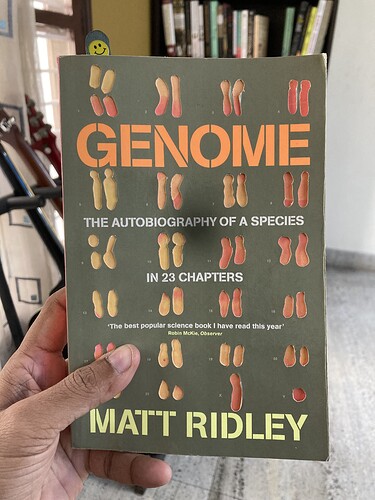Genome, Matt Ridley, 1999 - My knowledge of genetics/human genome is very rudimentary (high-school biology), so had got this book to get bit better on the subject. This is a fun read to dabble on the subject (although it could be very dated as its couple of decades old in a fast-growing field). The primer at the beginning of the book was very useful in getting to terms with the terminology.
Essentially, human genome is a book with 23 chapters (chromosomes) and each chapter has several thousand stories (genes), each story is made of several paragraphs (exons), interrupted by ads and nonsense (introns), each paragraph is made of words (codons) and words is composed of letters (bases Adenine, Cytosine, Guanine, Thymine & - ACGT). The genome, unlike a normal book can also photocopy (Replication) and read (Translation) itself. The replication happens through a mechanism where A pairs with T and G with C → so ACGT become TGCA and that in-turn becomes ACGT, thus creating a new copy of ACGT.
The translation or going with the analogy of interpreting the meaning of the text, happens using mRNA (messenger RNA) which copies the exons of the DNA (spliced together) without the introns (excised) and using ribosome in the cell, is interpreted in a different language with the help of tRNA (transfer RNA) where 3 letters codons correspond to 1 amino acid (20 in all) and these amino acids fold onto themselves based on the sequence, forming a protein.
The rest of the book is an ode to the human genome with each chapter picking one chromosome (so there are 22 chapters - X&Y treated as one pair) and telling the story through a gene expressed from that chromosome, dictating a particular trait, although things get quite nebulous because of the interdependencies between different genes that affect perceivable behavior, and the nature vs nurture debate runs almost throughout the rest of the book, along with complex philosophical questions like self, eugenics, personality, immortality, freewill and so on. This was a very enjoyable and informative read where we get a grasp of the decentralized way in which life as we know it works. 9/10

